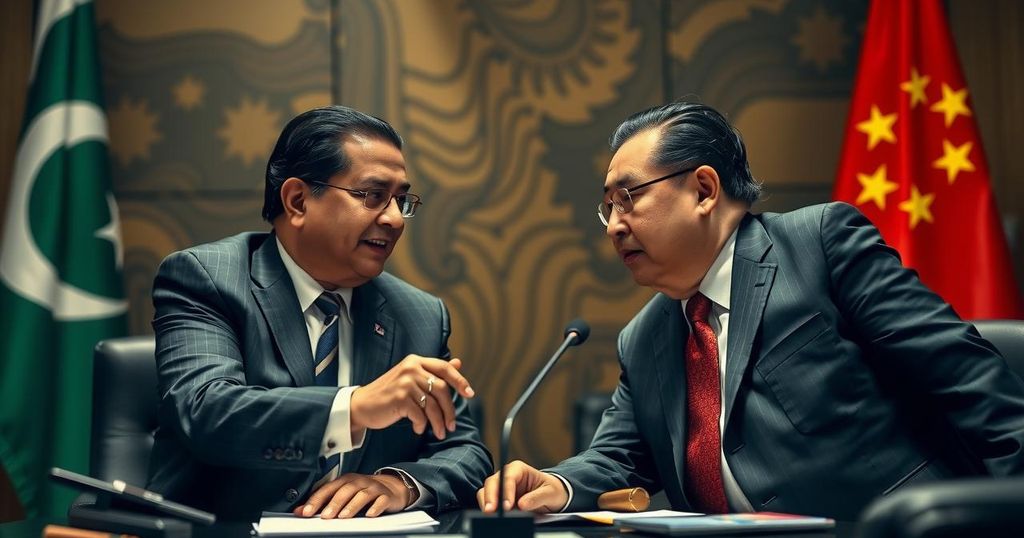Pakistan’s Finance Minister Reports Positive Developments in Debt Negotiations with China
Pakistan’s Finance Minister Muhammad Aurangzeb has reported encouraging responses from China regarding the extension of loan maturities under the Belt and Road Initiative. This move aims to alleviate financial pressures related to soaring electricity costs. Following a new IMF loan program and debt rollover arrangements, Pakistan seeks to implement structural reforms and enhance tax revenues to combat longstanding fiscal challenges, while ensuring a supportive environment for private sector growth.
Pakistan’s Finance Minister Muhammad Aurangzeb recently reported that the country is receiving a favorable response from China regarding its proposal to extend the maturities for loans taken under the Belt and Road Initiative. This development may provide much-needed financial relief for Pakistan, which has faced significant challenges due to previously high borrowing costs. In an interview conducted during the annual meetings of the International Monetary Fund (IMF) and World Bank in Washington, Aurangzeb emphasized that the discussions with Chinese officials were still in the early stages yet very promising. He highlighted the urgent need to restructure the debt incurred for constructing power plants, which is essential for creating fiscal space to allow for a reduction in electricity pricing. Aurangzeb noted the alarming rise in electricity costs, which have tripled for many residents, surpassing even housing expenses. He remarked, “We have just started that discussion and the response is encouraging,” indicating optimism regarding ongoing negotiations. Following the recent approval of a $7 billion loan program from the IMF, Pakistan has witnessed a degree of financial stability. The country has managed to arrange for the rollover of $16 billion of the approximately $26 billion debt due within the current fiscal year. Plans are in place to engage in further discussions to secure additional funding from the IMF via its climate resiliency fund. Aurangzeb stressed the necessity of implementing lasting reforms in several key sectors, such as tax collection, energy, and state-owned enterprises, in order to escape the cycle of debt that has plagued Pakistan for decades. During an IMF forum, he stated, “We’ve had so many programs. We’ve had boom and bust cycles,” underscoring the need for structural reforms to ensure sustainable economic growth. Moreover, the government intends to create a favorable environment for private sector growth by reducing public expenditures, which includes streamlining the bureaucracy by reducing the number of ministries and eliminating 150,000 federal positions. In efforts to enhance tax revenue, the government will focus on previously resistant sectors such as retail and agriculture, with legislation aimed at taxation slated for progression by January with collection efforts commencing by July. Pakistan’s participation in the Belt and Road Initiative has been pivotal, addressing long-standing electricity shortages. Currently, the government aims to re-negotiate the debt for nine power plants built by Chinese firms within the framework of this initiative. Encouragingly for investors, consumer price inflation has recently slowed to its lowest rate in nearly four years, while the benchmark stock index has increased by an impressive 70 percent over the past year, making Pakistan’s market one of the strongest performers globally. The central bank, in response to stabilizing economic conditions, has reduced its benchmark interest rate from an all-time high of 22 percent to 17.5 percent, with potential further reductions anticipated in forthcoming meetings.
Pakistan has been heavily invested in the Belt and Road Initiative, a Chinese strategic program aimed at developing infrastructure in various countries. Through this initiative, Pakistan has secured substantial loans to address key issues, notably its prolonged electricity crisis. However, the nation faces challenges related to managing its rising debt levels, prompting discussions about extending repayment terms to improve financial sustainability and stability. Pakistan’s economy has been under pressure from high inflation and costly borrowing, making the support from China vital for its fiscal health.
In conclusion, Pakistan is actively seeking to negotiate extended maturities for its Belt and Road Initiative loans with China, as this may provide much-needed financial relief amid rising electricity costs and an extensive debt load. The country’s finance minister has expressed optimism about the ongoing discussions, while also acknowledging the critical need for institutional reforms across various sectors to ensure long-term economic stability. As Pakistan attempts to navigate its financial challenges, the international support it garners, particularly from China, will play a significant role in shaping its economic future.
Original Source: www.business-standard.com








Post Comment